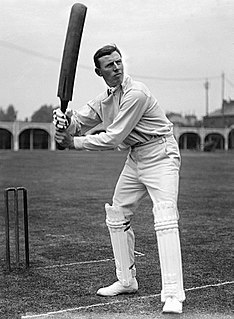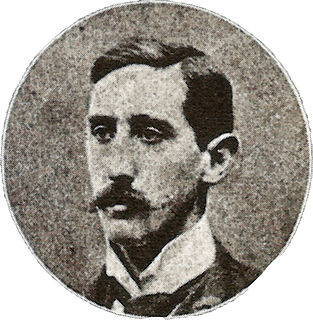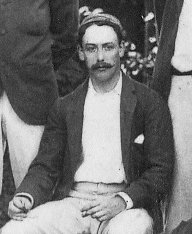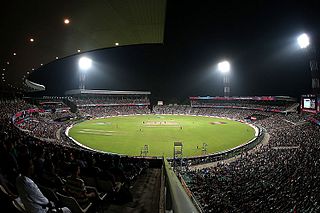George Dunsford Barne was a Jamaican-born British cricketer who played for Somerset County Cricket Club and an Anglican priest who became Bishop of Lahore from 1932 until 1949.
Bruce de la Coeur Hylton-Stewart was a musician and schoolteacher who played first-class cricket for Somerset and Cambridge University between 1912 and 1914.

Peter Randall Johnson was a cricketer who played for Cambridge University, Somerset and several amateur sides in a long first-class cricket career that stretched from 1900 to 1927. During his career, he appears to have been known, somewhat formally, as "P. R. Johnson"; modern websites refer to him as "Randall Johnson". Somerset colleague Jack MacBryan, who didn't like him, called him "Peter Johnson".
Paul Andrew Clayden Bail played first-class cricket for Somerset and for Cambridge University.
Hugh Edmund Watts was an English cricketer who played first-class cricket for Somerset as an amateur player before and after the Second World War. He also played for Cambridge University in 1947, winning a blue by playing in the annual Varsity cricket match against Oxford. In his working life, he was a schoolmaster, and most of his first-class cricket was played in school holiday times.
Guy Fife Earle, born at Newcastle upon Tyne on 24 August 1891 and died at Maperton, Wincanton, Somerset, on 30 December 1966, played first-class cricket for Surrey and Somerset for 20 years before and after the First World War. He also played in India, Sri Lanka, Australia and New Zealand as a member of official Marylebone Cricket Club touring teams, though he did not play Test cricket.
John St John Frederick was an English first-class cricketer who played as a right-handed batsman and a right-arm roundarm fast bowler.
George Stephen Butler, born at Marlborough, Wiltshire on 16 December 1900 and died at Kingswear, Devon on 21 September 1969, played first-class cricket for Somerset in one match in 1920 and Minor Counties cricket for Wiltshire from 1920 to 1939. While appearing for Wiltshire, he also played in seven first-class matches, mostly for teams representing the Minor Counties as a whole against touring sides in the 1930s.

Charles Edward Dunlop played first-class cricket for Somerset from 1892 to 1905. He was born at Edinburgh, Scotland and died at Kensington, London.
Simon Charles Ecclestone played first-class and List A cricket for Oxford University and Somerset between 1994 and 1998. He also appeared in 1992 in List A cricket for Cambridgeshire. He was born at Great Dunmow, Essex.
William (Bill) Montgomery played first-class cricket for Surrey and Somerset between 1901 and 1907. He was born at Staines, then in Middlesex and died at Peterborough.
James Maxwell played first-class cricket for Somerset from 1906 to 1908. He was born and died at Taunton, Somerset.

Lyonel D'Arcy Hildyard played first-class cricket for Somerset from 1882 to 1883, for Lancashire in 1884 and 1885, and for Oxford University from 1884 to 1887. He was born at Bury, then in Lancashire, and died at Rowley, near Hull, Yorkshire.
Leigh Dunlop Brownlee was a journalist who became editor of the Daily Mirror from 1931 to 1934. He also played first-class cricket for Gloucestershire, Oxford University and Somerset between 1901 and 1909. He was born at Bristol and died at Clifton, also in Bristol.
Not to be confused with Cleveland, Ohio's first permanent African-American settler, George Peake
Dudley David Pontifex was an English cricketer who played first-class cricket for Surrey, Somerset and the Marylebone Cricket Club, plus other amateur sides, between 1878 and 1896. He was born at Weston, Bath, Somerset, and died at West Dulwich, London.
Reginald Trevor Crawford was an English cricketer who played as a right-handed batsman and a right-arm fast-medium bowler in first-class cricket between 1901 and 1911. He played mainly for Leicestershire from 1901 to 1907, returning for a single match in both 1910 and 1911, and also played for amateur teams. He was born in Leicester and died at Swiss Cottage, London. He was the brother of the England Test cricketer Jack Crawford and of the Surrey and Leicestershire first-class cricketer Vivian Crawford.
John Morley Lee was an English clergyman and cricketer who played in first-class cricket matches for Cambridge University, Surrey, Marylebone Cricket Club (MCC) and various other amateur teams in the late 1840s. He was born at Chelsea, London and died at Botley, Hampshire.
Joseph William Marshall was an English clergyman and a cricketer who played first-class cricket for Cambridge University and Cambridge Town Club. He was born in Cambridge and died at Kidbrooke, Blackheath, London.
The Reverend Trevitt Reginald Hine-Haycock was an English clergyman who served as Priest in Ordinary to the King from 1905 to 1931 and, briefly, to Queen Elizabeth II in the first years of her reign. He also played cricket as an amateur sportsman for Oxford University and Kent County Cricket Club from 1882 to 1886.












